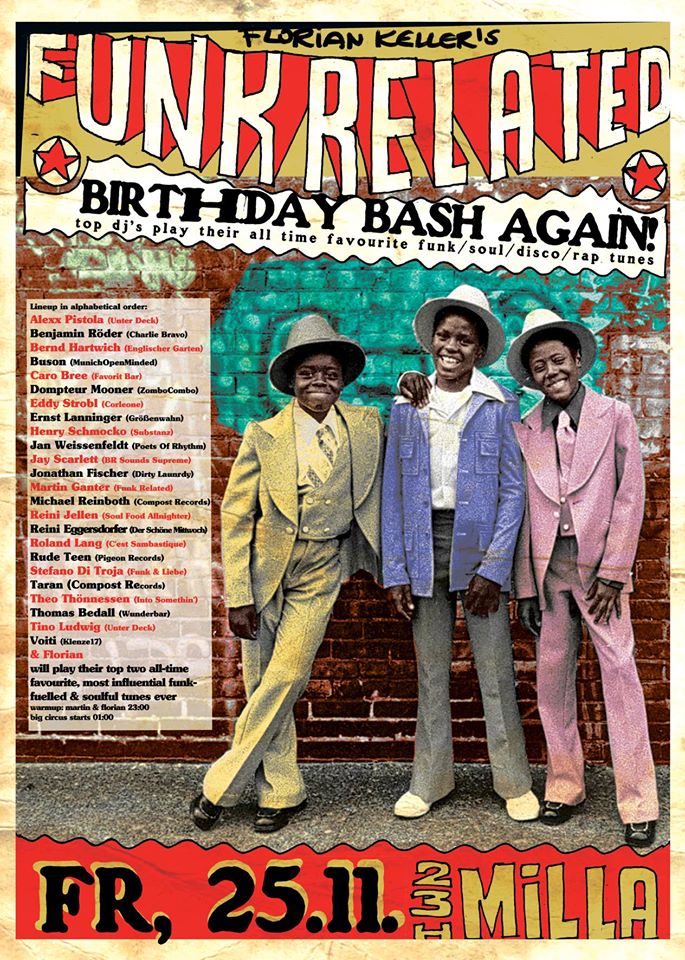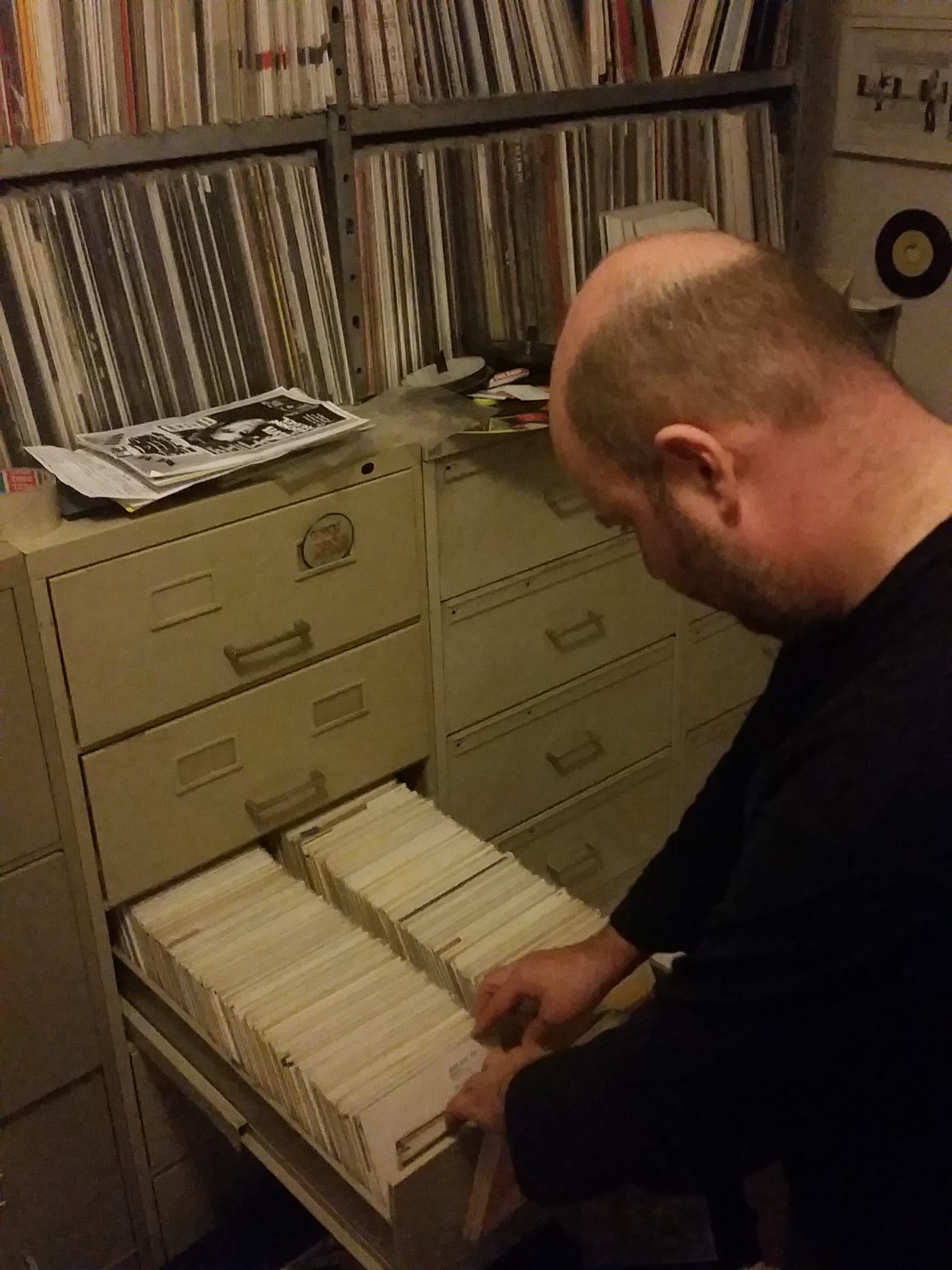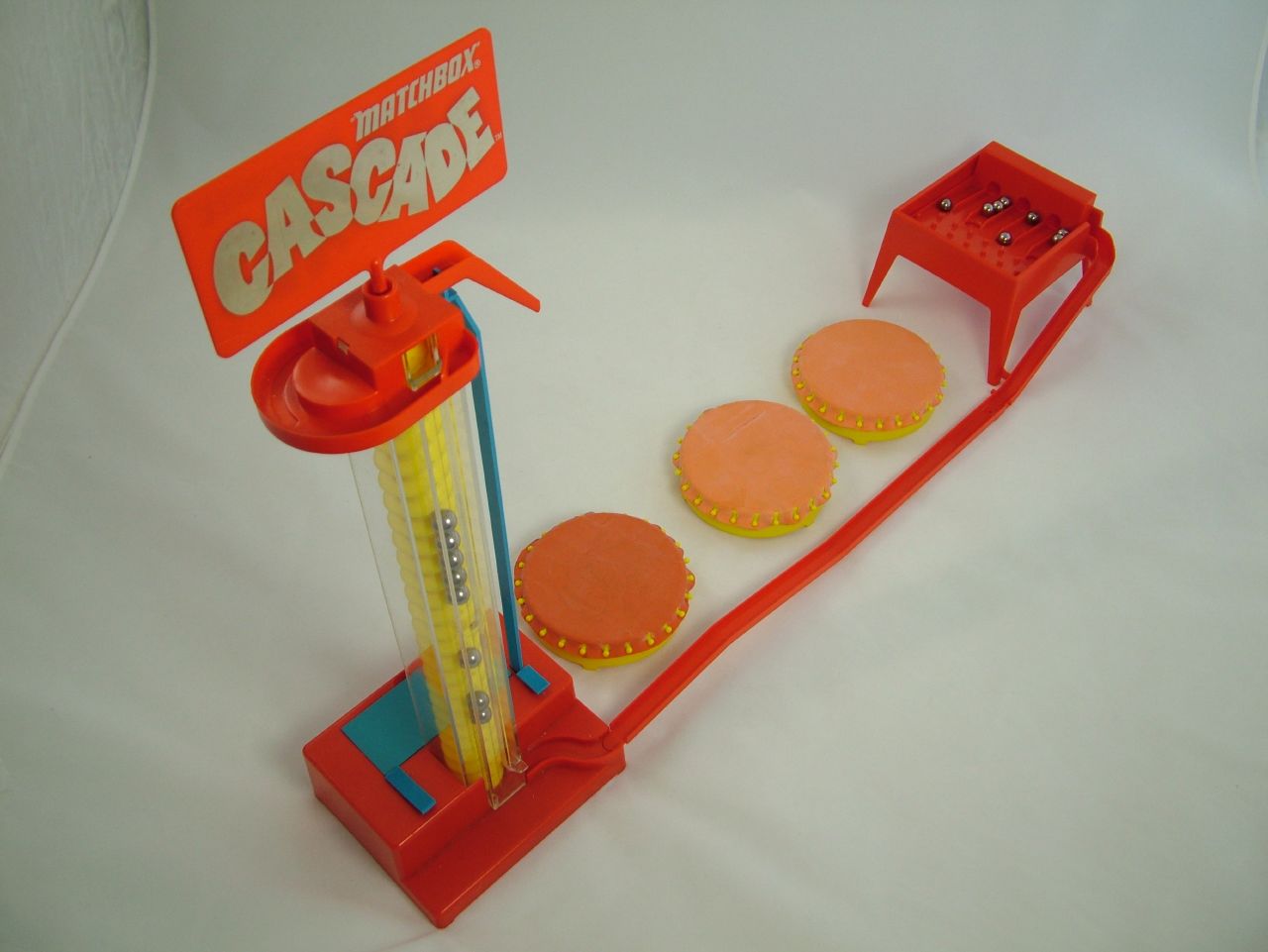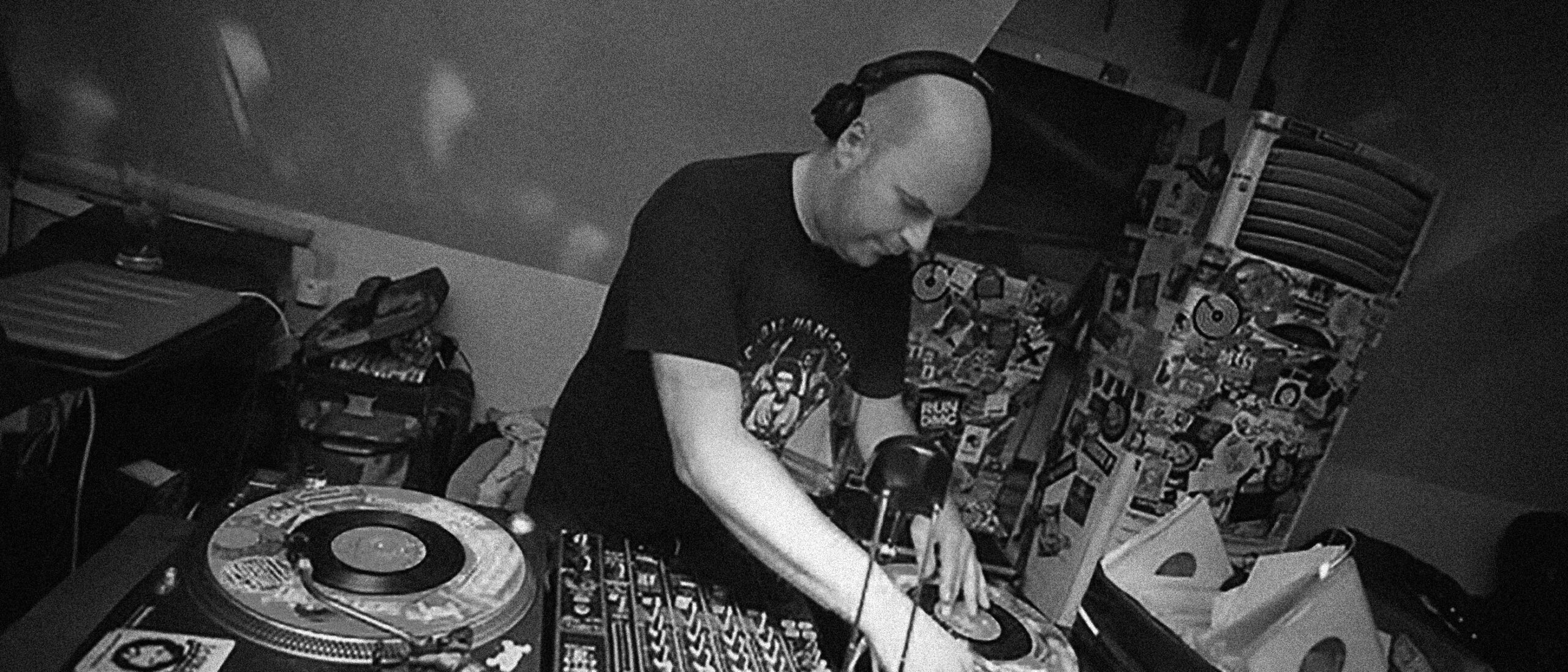When it comes to serious collectors and DJ’s of funk and soul in Germany, Florian Keller is definitely of the guys to go for. Being in the game for around three decades, the Munich-based heavy hitter has not only toured the globe digging records and moving crowds. Moreover, he has witnessed the different stages in the appreciation of soulful music and the changing landscape of nightlife throughout Europe. With his parties, releases and ideas, Florian Keller has significantly contributed to the development of the German funk and soul scene. Right now, his most recent project is a new club night called FUNK RELATED that goes down every fourth Friday of the month at the Milla Live Club in Munich. We are happy that Florian took some time to sit down with us and share his thoughts, insights, stories and opinions.

Scarce One:
First of all, please introduce yourself. How did you find your way into Funk and Soul music?
Florian Keller:
Basically you can say that when I was born, “I was immediately bitten by the “music bug”. So, when I was five years old I discovered the Beatles and started saving my weekly pocket money to ultimately be able to buy the “White Album”. From that point on, even as a child, it has always been candy and records for me. A couple of year’s later, when I had turned 9 or 10, I cannot remember it correctly – a friend of my mother who was born in the USA, showed me a (German) compilation entitled “That’s Black Music” which had “Sex Machine” and “Move On Up!” on it. Those two tracks totally blew me away and I felt in some way like being (musically) born again. From that point on I started digging James Brown; mainly by carefully reading the liner notes trying to find associated musicians and see if they also had released something. In the early 1980’s, as a teenager, I then found out about the mail order lists like Craig Moerer’s (Records By Mail) or the “45 Center”. There were also these other guys from Bremen (in the North of Germany), Gehde Köster and Detlev Kögel. One of them had a company that equipped jukeboxes while the other was selling overstock vinyl as extra weight for ship bodies (!!!). They used to buy jukeboxes from the USA to refurbish them while also selling the records they contained. You know, in this pre-internet era it was all about brachiating from one artist, producer and label to the next. (…) Local record stores in Munich were really not an option at that time (the early 1980’s) since I was only interested in heavy, back-beat driven Funk and pretty much disliked any contemporary “Soul” music by artists like the Gap Band or others. Back then I really had my troubles with this straight, disco-type of beats and it took me many years to also appreciate it.
Scarce One:
After all these years of putting hard work into collecting records, how did you then end up DJ’ing?
Florian Keller:
It was around ’85-’86 when the first turntable bar (which was called “Wunder Bar”) opened up in Munich. After initially aiming for a job as graphics designer I changed my mind and went to college to study industrial design instead. Consequentially, since my parents were not really wealthy at all, I had to earn some money on my own. I had already played records for several years at different high school parties and now took one of the mixtapes I used to make for girls or friend’s, went to that bar and told them that I wanted to DJ there. Luckily, the who was the resident there happened to drink to much Vodka and fall asleep behind the turntables for the third time, so the owner gave me a try and let me play. Finally, in October 1991, another great Soul DJ, Michael Reinboth and a friend of mine, Theo Thönnessen, were asked to play a regular Tuesday’s Jazz night at a club called “Babalu”, which was really hip at that time. So, both guys asked me to join them and we started our party Into Somethin’ . Soon thereafter it was no more 20-30 people who showed up but more like 300-400…on a Tuesday! Having such a success we continued with Into Somethin’ for a year and then relocated to the “Park Café” which was bigger (with around 800 people) and where we could play on a Friday.
 Scarce One:
Scarce One:
Some commentators and enthusiasts describe Munich (together with Hamburg) as Germany’s Funk city; especially during the 1990’s. Since you have not only witnessed but also contributed to all the different developments that unfolded there, what was the vibe like and how was the scene back then?
Florian Keller:
In the early and mid-1990’s it felt more like being part of an emerging international scene. You had the London scene, the guys over there in Japan like UFO, Takemura and Krush which we got to know. You had Switzerland with Peter Wermelinger throwing legendary (raw funk) parties; very often in remote and obscure locations like barns or something in small towns. And finally, here in Germany there was Hamburg, with clubs like Soul Kitchen or Mojo, The Beat Box that later became Groove Attack in Wuppertal and Cologne, and us here in Munich. And, although it might sound odd, that was pretty much everything that was going on at that time. The vibe was really amazing since people were like “I don’t care if this music is new or old, I just want to listen and dance to this type of stuff!”. You might compare it a bit to the Northern Soul movement that I actually found out about years later. And on top of all these things there were also certain bands coming up, complementing the scene with new music. Amid them you had for example the Poets of Rhythm here in Munich, and of course in London groups like Galliano (the first signing to Eddie Piller’s and Gilles Peterson’s Acid Jazz label). In general the vibe was really amazing and the development was into the direction of a growing appreciation of the DJ as an artist on it’s own, going away from being a mere permanent staff of a certain discotheque to becoming a stand-out and regularly booked artist with an own repertoire. You know, being able to pull out really obscure and raw stuff and put it on the turntables while everybody was going off to it was a great adventure to experience and definitely made that time so exciting and special. Unfortunately it only lasted three to four years before it started to change again. But within that period we had a lot of guests performing like A Tribe Called Quest or Gil Scott Heron and The Last Poets. Also we welcomed DJ Shadow a couple of months before the (1993) Groove Robbers picture disc came out. He was the first DJ from the United States that I had met which was not doing something contemporary to be cool but just followed his own thing. On the other hand I tried to go on digging missions throughout the USA as often as I could afford it. One day I was traveling with Jan Weissenfeldt (of the Poets of Rhythm) who had just arranged a gig at the Elbo Room in San Francisco, a place that was really hip at that time and had a Rare Groove night going on. That was actually really funny, because Jan and I were really looking forward to playing that night after we had obtained all these (now) sought-after records on our four weeks of digging. Interestingly, after we had played for roughly 40 minutes the resident DJ came to us and said that it would probably be better if he continued spinning. So he briefly put on “Papa Don’t Take No Mess” before going straight into TLC and En Vogue. Nobody danced to our set and this was a good example that in the US themselves it (understandably) took most definitely some more years before that type of music really came back.
Scarce One:
That is definitely an interesting point: in the country where the entire foundation of Funk and Soul has its origins, re-appreciation is sometimes more difficult to manifest than elsewhere … This also perfectly leads us to the next aspect of [Nostalgia King] which is culture. Not only do we try to catch and transfer that certain vibe of a very specific cultural era musically. We also seek to visualize its essence e.g. by putting extra effort into designing the posters to promote the parties. With your legendary party series Partykeller (which was also the title of some of the compilations you put out on Compost Rec.) you seem to have chosen a very similar approach adding your very own twist to it. Could you elaborate on how do you do your designs and what is important for you?
Florian Keller:
Soon after Into Somethin’ we came up with our first pure Funk & Soul night called Funk Squad. It must have been late 1993 or early 1994. We decided to add a special visual aspect to the party and prepared some (analog) slides. Back then I had an old Mercedes with blue stripes and a blue light on top and we mimicked scenes from “Streets of San Francisco” which we then showed with a diascope at the parties. We even made enameled police badges with the Funk Squad logo on it. Though I really loved doing this, retrospectively it now sounds like the perfect cliché, but it was a really creative time. Of course, the first impressions were rather superficial but we then really quickly started digging deeper into the whole funk and soul culture and basically absorbed everything we could find. For example while being on one of our digging tours in the United States we went to a lot of tiny little shops in many of the small towns on the (Southern) East Coast which were selling also magazines, comics and other stuff in addition to records. So, I came across old issues of Jet or Ebony that featured stories like “Alvin Cash at Home” or Freda Payne exhibiting bikinis and beach wear. Those types of stories actually helped me a lot to get some information about the context and culture surrounding the music I was listening to. Regarding the flyers I have to say that I was practically the first generation growing up with all the computer devices, so e.g. Photoshop was becoming very popular. However, I wasn’t feeling it and purposely stayed away from it. While preparing the design for our first Funk Squad party, I was very uninspired and tried different things which did not convince me. One day I came across the first old school Hip Hop block party flyers (by guys like Phase2 or Buddy Esquire) that were a huge inspiration for me. So I took pencils, markers, a set square and other things and began developing the first design. I always had the aim of doing something hand made with all the flaws it may contain, but never obviously shabby.
Scarce One:
Another thing that immediately drew my attention was your advertisement of a vintage 1970s Italian coffee maker. Since Butta 45s is also about rare memorabilia and nostalgic collectors’ items, I would like to know how you relate this to your musical and cultural interests and if you are also a collector of such things yours
Florian Keller:
For me it is always about originality and authenticity in things. I do not care whether something comes from the 1920s, the 1970s or 2015. I think there is so much stuff out there, regardless of art, painting, music, design, whatever, that it is really difficult to come up with than some things new or innovative. So, most of the time I prefer sticking to the original, because I believe that you can feel the unique spirit of discovering a new world which was attached to something by the people creating it in the first place. I am not nostalgic in the sense of only looking back in a reductionist way like “oh, the world was so much better”, but I think that there was a time when people were experimenting more and things did not have to be solely efficient, cheap and economical. The materials used were often more expensive and it was also much about the beauty and aesthetics of things. Although I am not a continuous collector I buy things from time to time but also resell them. For instance, I have these Italian coffee makers from the 1970s, a classroom bench from the early 1900s, various quadrophonic amplifiers and also a lot of psychedelic and other records or movies.
Scarce One:
That is great, because movies play also an important part in the [Nostalgia King] universe. So, what are your favorite TV shows and flicks of all time?
Florian Keller:
I have to admit that I am way more into movies than TV shows, but nevertheless I like:
- The Twilight Zone (the original series from the 1950s-60s)
- Soul Train
- The Streets of San Francisco
Concerning movies I definitely go for (sorry for the long list):
- Sunset Boulevard (by Billy Wilder)
- The Man Who Wasn’t There (by the Coen brothers)
- The Umbrellas of Cherbourg (a French musical film)
- The Woman in the Dunes (Japanese title: “Suna no Onna”)
- Freaks (by Tod Browning)
- The Last Picture Show (by Peter Bogdanovich)
- The Swimmer (by Frank Perry)
- Putney Swope (“The Truth & Soul Movie”)
Scarce One:
Wow, nice. Interestingly, most of the movies are from the 1960’s, which actually surprises me. But that also shows that you don’t go for the “obvious” 1970’s, which is great. Anyways, as a last question I would really like to ask you what is your favorite toy?
Florian Keller:
I think I already gave Skeme the assignment to find it in the US. Back then it was distributed in Germany by Mattel as a part of its Matchbox series. The toy was some sort of marble catapult, a game called Cascade (from 1972).

Scarce One:
Dope. Do you have any additional things to say, for example about future projects?
Florian Keller:
Well, maybe only one thing: some day in the future I really want to release another compilation; this time with songs which are great tunes but due to being bad recordings cannot be played in a club. I am working on this with a friend of mine who is a sound engineer we will hopefully be able to give these songs a proper sound quality. Also, this might add a new aspect to all the remixing and reediting that is currently going on and which sometimes results in versions that are too clean and sterile. So what we want to do is to maintain that certain raw feel of the music but at the same time make the songs “playable” to a party crowd.
Scarce One:
Alright, thank you very much Florian for taking the time and sharing your stories with us. I really enjoyed it and hopefully we will be able to collaborate again in the future. Wishing you all the best to you and your future projects. Peace!
Florian Keller:
No problem, thanks for having me and I also really enjoyed talking about all the different things. It was definitely fun and much more diversified than the average interview. See you soon.
For more check:
https://www.facebook.com/FunkRelated
https://www.facebook.com/pages/Florian-Keller-Dj/110652072324138?fref=photo

